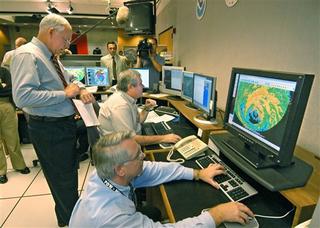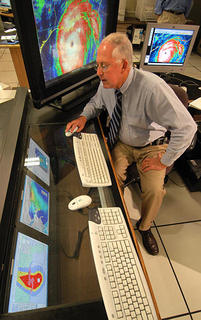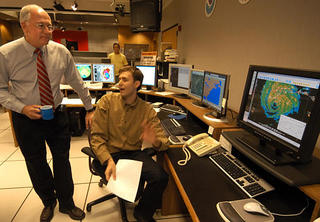KATRINA / Life is hectic at the hurricane center when a major storm hits
JOHN PAIN/Associated Press
MIAMI (AP) -- Max Mayfield stared at the frightening images on the radar screen -- Hurricane Katrina was about to hit Louisiana and Mississippi with 140-mph winds and flooding that would likely obliterate some of the levees protecting New Orleans's areas below sea level.
"This is going to be a terrible day," the National Hurricane Center's director said as he shook his head.
 As the Category 4 storm threatened to submerge the Big Easy early Monday, about a dozen forecasters swarmed around brightly colored computer monitors showing Katrina's wind speed and atmospheric pressure.
As the Category 4 storm threatened to submerge the Big Easy early Monday, about a dozen forecasters swarmed around brightly colored computer monitors showing Katrina's wind speed and atmospheric pressure.
Mayfield, deputy director Ed Rappaport and others juggled all sorts of duties -- making forecasts, passing information to emergency officials in hard-hit areas, briefing the flock of reporters milling right in the main work area. At one point, Mayfield took a call from Commerce Secretary Carlos Gutierrez, who congratulated the center for its accurate work under pressure.
"That doesn't happen every day," a smiling Mayfield said. One local emergency official complained that the first of four hurricanes that hit Florida last year didn't hit where the center predicted it would, even though his county was squarely within the hurricane warning zone.
As it turned out, Katrina made a slight turn to the right before hitting land just outside New Orleans, sparing the city from a catastrophe of biblical proportions. But that turn was just 15 miles off of the track projected by the hurricane center on Friday night.
outside New Orleans, sparing the city from a catastrophe of biblical proportions. But that turn was just 15 miles off of the track projected by the hurricane center on Friday night.
"If that is not a superb forecast, I don't know what is," Mayfield said, adding that the strength forecast is far less accurate.
He worried about Louisianans and others who didn't follow evacuation orders, remembering stories of those who tried to escape other major storms that hit the northern Gulf Coast in the 1960s.
"They were up in the attic and they had to chop their way out of their attic when the water came up," he said.
As the worst weather hit New Orleans, forecasters started to lose some data from Louisiana. Radar and observation sites got knocked out by winds, and they lost communication with some weather offices. So Mayfield relayed details of damage that he heard from the field or saw on television.
”There's 3 or 4 feet of water over U.S. 90 in Mississippi," he said.
”Wow. Already?" meteorologist Eric Blake asked.
”Already," Mayfield said grimly.
Later on, he asked forecasters: "Did you hear that part of the Superdome roof blew off?"
They replied with silence, focusing on the work at hand. Richard Pasch, one of six hurricane specialists, kept rolling his chair between computer screens and paper maps as he handled writing the advisories that tell the public what to expect.
Forecasters are scheduled to work in eight-hour shifts even during catastrophic storms like Katrina so they don't burn out.
 The hurricane center's bunker-like building has generators for emergency power and walls and a roof made of 10-inch thick, steel-reinforced concrete. The tornado-safe bathrooms have walls and a ceiling 20 inches thick. That came in handy last Thursday when Katrina's eye passed directly over the center as it pushed through South Florida.
The hurricane center's bunker-like building has generators for emergency power and walls and a roof made of 10-inch thick, steel-reinforced concrete. The tornado-safe bathrooms have walls and a ceiling 20 inches thick. That came in handy last Thursday when Katrina's eye passed directly over the center as it pushed through South Florida.
”You could almost set off a nuclear bomb nearby and you wouldn't notice,” hurricane center spokesman Frank Lepore joked.
Hurricane specialist Stacy Stewart noticed how the mood in the forecast room got a little more relaxed Monday when the storm weakened from a Category 5 before landfall. That was a welcome change form the forecasters, some of whom didn't have power at home after Katrina hit South Florida as a much weaker Category 1 storm.
Chris Sisko, a meteorologist, said Katrina gave him some sleepless nights.
I got sick to my stomach worrying about the people who were going to get hit by this,” he said. He stayed up to sign into the hurricane center's computer system, poring over the latest reports.
Right after Rappaport signed off from his last media briefing, he joked about the next tropical system far out in the Atlantic: "So when will I see you guys again? Tomorrow?"
MIAMI (AP) -- Max Mayfield stared at the frightening images on the radar screen -- Hurricane Katrina was about to hit Louisiana and Mississippi with 140-mph winds and flooding that would likely obliterate some of the levees protecting New Orleans's areas below sea level.
"This is going to be a terrible day," the National Hurricane Center's director said as he shook his head.
 As the Category 4 storm threatened to submerge the Big Easy early Monday, about a dozen forecasters swarmed around brightly colored computer monitors showing Katrina's wind speed and atmospheric pressure.
As the Category 4 storm threatened to submerge the Big Easy early Monday, about a dozen forecasters swarmed around brightly colored computer monitors showing Katrina's wind speed and atmospheric pressure.Mayfield, deputy director Ed Rappaport and others juggled all sorts of duties -- making forecasts, passing information to emergency officials in hard-hit areas, briefing the flock of reporters milling right in the main work area. At one point, Mayfield took a call from Commerce Secretary Carlos Gutierrez, who congratulated the center for its accurate work under pressure.
"That doesn't happen every day," a smiling Mayfield said. One local emergency official complained that the first of four hurricanes that hit Florida last year didn't hit where the center predicted it would, even though his county was squarely within the hurricane warning zone.
As it turned out, Katrina made a slight turn to the right before hitting land just
 outside New Orleans, sparing the city from a catastrophe of biblical proportions. But that turn was just 15 miles off of the track projected by the hurricane center on Friday night.
outside New Orleans, sparing the city from a catastrophe of biblical proportions. But that turn was just 15 miles off of the track projected by the hurricane center on Friday night."If that is not a superb forecast, I don't know what is," Mayfield said, adding that the strength forecast is far less accurate.
He worried about Louisianans and others who didn't follow evacuation orders, remembering stories of those who tried to escape other major storms that hit the northern Gulf Coast in the 1960s.
"They were up in the attic and they had to chop their way out of their attic when the water came up," he said.
As the worst weather hit New Orleans, forecasters started to lose some data from Louisiana. Radar and observation sites got knocked out by winds, and they lost communication with some weather offices. So Mayfield relayed details of damage that he heard from the field or saw on television.
”There's 3 or 4 feet of water over U.S. 90 in Mississippi," he said.
”Wow. Already?" meteorologist Eric Blake asked.
”Already," Mayfield said grimly.
Later on, he asked forecasters: "Did you hear that part of the Superdome roof blew off?"
They replied with silence, focusing on the work at hand. Richard Pasch, one of six hurricane specialists, kept rolling his chair between computer screens and paper maps as he handled writing the advisories that tell the public what to expect.
Forecasters are scheduled to work in eight-hour shifts even during catastrophic storms like Katrina so they don't burn out.
 The hurricane center's bunker-like building has generators for emergency power and walls and a roof made of 10-inch thick, steel-reinforced concrete. The tornado-safe bathrooms have walls and a ceiling 20 inches thick. That came in handy last Thursday when Katrina's eye passed directly over the center as it pushed through South Florida.
The hurricane center's bunker-like building has generators for emergency power and walls and a roof made of 10-inch thick, steel-reinforced concrete. The tornado-safe bathrooms have walls and a ceiling 20 inches thick. That came in handy last Thursday when Katrina's eye passed directly over the center as it pushed through South Florida.”You could almost set off a nuclear bomb nearby and you wouldn't notice,” hurricane center spokesman Frank Lepore joked.
Hurricane specialist Stacy Stewart noticed how the mood in the forecast room got a little more relaxed Monday when the storm weakened from a Category 5 before landfall. That was a welcome change form the forecasters, some of whom didn't have power at home after Katrina hit South Florida as a much weaker Category 1 storm.
Chris Sisko, a meteorologist, said Katrina gave him some sleepless nights.
I got sick to my stomach worrying about the people who were going to get hit by this,” he said. He stayed up to sign into the hurricane center's computer system, poring over the latest reports.
Right after Rappaport signed off from his last media briefing, he joked about the next tropical system far out in the Atlantic: "So when will I see you guys again? Tomorrow?"

<< Home